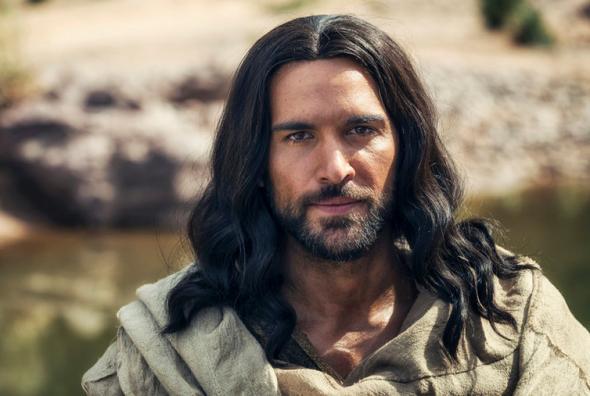Jesus is crucified 15 minutes into the first episode of A.D.: The Bible Continues, the miniseries that premieres Sunday on NBC, and he rises from the dead by the end of the hour: Easter weekend for short attention spans. From there, the plot proceeds through the events in the first 10 chapters of the New Testament book of Acts, which follows the growth of the early church.
That is to say, A.D. is not about Jesus, but about his followers, including disciples Peter and John. But, yet again, the Jesus we see on screen lacks the kind of charisma the original must have possessed. A.D.’s son of God is another dreamy, drippy long-haired guy who glows from within. Played by Juan Pablo di Pace, an Argentine who has said that he was named after Pope John Paul II, he seems like a nice-enough guy, but nice-enough guys don’t start international religious movements that thrive for thousands of years.
What exactly does it take to build such a movement, and how did the early church grow so dramatically after its founder’s early, violent death? That’s a great story whether or not you believe in the divinity of Jesus. A.D. takes a House of Cards approach to first-century Jerusalem: Within the first two episodes, there’s a plot to overthrow Roman rule, strategizing over the optics of disposing of Jesus’ body, and a villain murmuring “If you cannot control a story, kill it.” A.D.’s Pontius Pilate is a ruthless murderer, in contrast to the Bible’s more ambiguous figure, and the high priest Caiaphas’s wife has become a Lady Macbeth type. Everyone speaks in British accents with low tones and they make constant eye contact with each other to telegraph their intensity.
A.D.: The Bible Continues is a sequel to the massively successful miniseries, The Bible, that aired on History Channel in 2013 and joins a heavenly host of other recent biblical series, including the scripted series Killing Jesus and CNN’s Finding Jesus: Faith. Fact. Forgery. In theaters, the last year alone has brought Noah, Exodus: God and Kings, and Son of God. The latest, A.D., is clearly meant for the devout, or at least the devout-adjacent. It is produced by Touched by an Angel star Roma Downey and Survivor mastermind Mark Burnett, who told Christianity Today that the explosion of Bible-based shows and movies is “a supernatural thing, and it’s part of the plan.” Pastors can buy “the official A.D. church kit,” which includes a sermon to accompany each episode. As promotional materials put it, “Imagine your congregation and community celebrating the resurrection of Jesus on Easter, and then watching the birth of the early church on primetime television with friends and neighbors!”
There’s nothing wrong with a series that takes the beliefs of conservative Christians seriously. This one happens to have high production values and melodrama that will appeal to some non-believers, too (although those totally unfamiliar with the story may get a little lost). But imagine an A.D. in which viewers can’t be certain whether Jesus’ followers moved his body in an attempt to jumpstart the fulfillment of a prophecy, and in which his reappearance to them could be read as either hallucination or reality. Leaving it ambiguous would make both the story’s politics and psychology more complex. Instead, we get badass angels rocketing down from heaven armed with swords, and a mystical beam of light emanating from Jesus’ tomb. The very first words in A.D. imply that this series might be different, asking, based on a quote from the book of John, “Truth? What is truth?” For better or for worse, the show’s answer is a simple one: The Bible.
